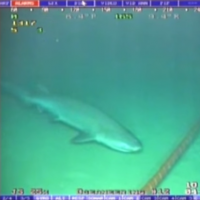Consider Unleashing Sharks to Test Internet Reliability

Google recently invested $300 million in an undersea cable system that helps with the transmission of Internet data from the west coast of the United States to two cities in Japan. The system is known as FASTER, and Google's interest in this investment lies in ensuring a faster, reliable response for its users. But Google is faced with an unexpected challenge—not from its usual competitors Apple and Facebook, but from sharks. Yes, you read that right—sharks.
A video, courtesy of Network World, reveals the affinity that sharks have for the undersea cables. Though it’s not known with certainty why sharks attack these cables, a recent Forbes article reveals some interesting information.
It is believed that the electrical current in the fiber-optic lines attract the sharks, triggering a feeding reflex. Sharks are known to have volt sensors in their mouths to find prey so the optical fiber cables may "confuse" them into thinking it is food.
Dr. Chris Lowe, one of the founders of the Shark Lab at California State University, Long Beach, believes that sharks attack the cables for a different reason. He told Wired that sharks may just be curious about the cables. "If you had just a piece of plastic out there shaped like a cable, there’s a good chance they’d bite that too."
The undersea cables and their quality are becoming increasingly more important for companies like Google as they work to expand their business reach. So whatever the reason for the attacks, Google is obviously working to find the solution. Despite the importance for Google to find a solution to this problem, it is equally important that the solution does not come at the expense of the aquatic life.
Google is said to be working with partner cable companies toward the reinforcement of these cables. The suggested process involves adding a layer of Kevlar to the cables. Kevlar is known as a high-strength material and by some measures is five times stronger than steel.
An article by Meghan Neal on Motherboard provides an alternative perspective about the situation. Neal argues,
...sharks do occasionally bite a cable, but they haven't developed a taste for them. Some 70 percent of cable faults are caused by ship anchors and fishing trawlers that inadvertently snag a comms cable. Another 10-15 percent of damage is from natural disasters like earthquakes, underwater landslides, or tidal currents dragging a line over the rocky surface.
Sharks are probably the most recent cause of cable vulnerability, but based on recent reports, the probability of sharks causing real damage is far less likely than it is made out to be. The shark situation is probably something that needs to be watched, but it is definitely not a reason to panic yet.
So, if you are a tester doing reliability testing for Google, will you have sharks in your arsenal to ensure that they don't cause unintentional havoc? As funny as it sounds, the more the world is getting connected, the more diverse are the causes of potential technological failures.
Do you agree?

